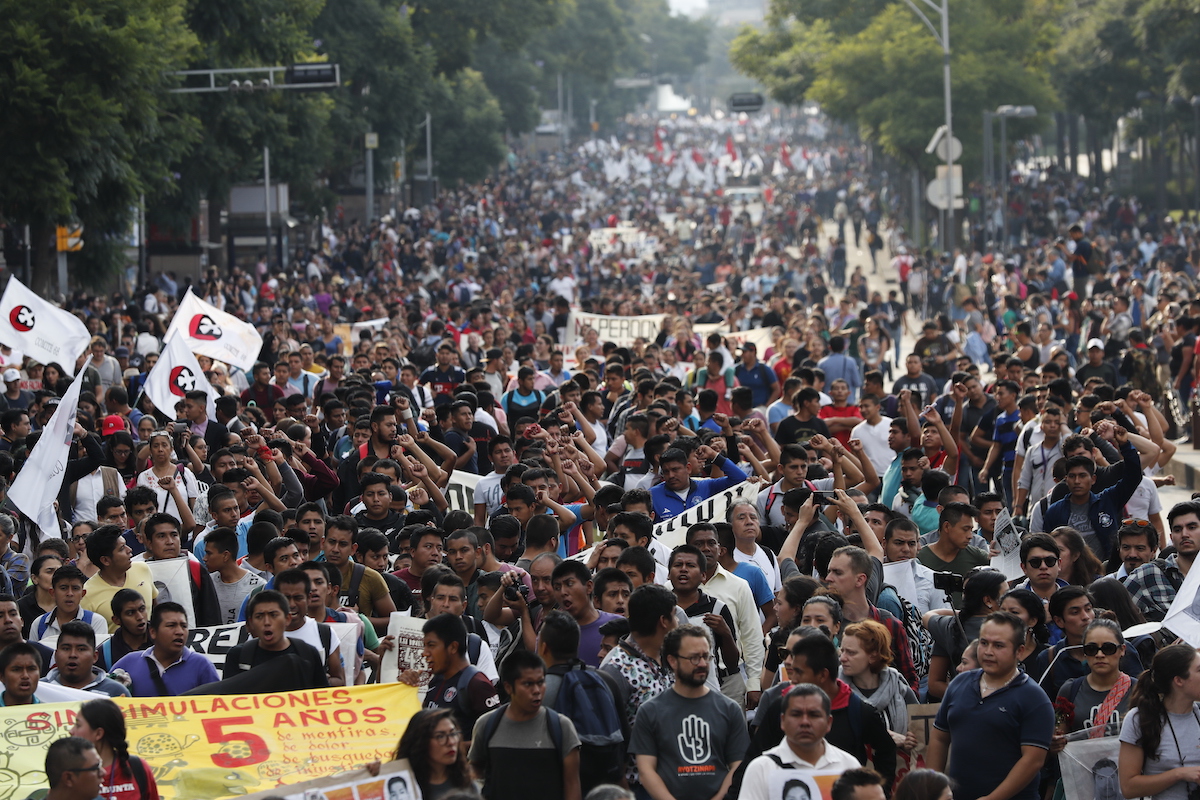

Demonstrators march along with relatives of 43 missing teachers’ college students as they protest on the fifth anniversary of the students’ disappearance, in Mexico City, Thursday, Sept. 26, 2019. (AP Photo/Marco Ugarte)
By MARÍA VERZA, Associated Press
MEXICO CITY (AP) — Five years after 43 students were kidnapped by police and turned over to a drug gang, Mexican authorities hunting for them say they have found dozens of clandestine graves and 184 bodies, but none of the missing students.
Alejandro Encinas, the administration’s top human rights official, said Thursday that searches based on tips continue at two points, one of them a garbage dump.
Encinas said investigators have so far found about 200 clandestine burial sites and recovered 184 bodies, none of them the students. Most are believed to be victims of drug gangs or kidnappers, but only 44 have been identified.
Both Encinas and President Andres Manuel López Obrador wore T-shirts at a morning news conference that read, “Ayotzinapa, 5 years, I’m for the Truth.”
Later, some of the students’ parents were invited to the floor of Congress, where the names of the 43 were read aloud, followed by chants of “Find them alive!”
On Thursday afternoon, the families and supporters marched to Mexico City’s main square. What began as a peaceful procession was marred by a small number of hooded vandals who broke windows, painted graffiti on walls and set fires at some businesses along the march’s path.
The families condemned the destruction, but expressed frustration about the long wait for answers about their children’s disappearance.


A demonstrator shouts slogans during a march commemorating 43 missing teachers’ college students on the fifth anniversary of their disappearance, in Mexico City, Thursday, Sept. 26, 2019. (AP Photo/Marco Ugarte)
“With only discourse and nice words we’re not going arrive at the truth,” said Mario César González, a father of a missing student. “We have to be a little more forceful.”
Luz María Telumbre marched with a photograph of her missing son hanging from her neck. “They need to hurry up with the truth,” she said.
The 43 teachers’ college students were detained by local police in the southern state of Guerrero in September 2014.
Investigators say police handed the students over to members of the Guerreros Unidos gang who purportedly killed and burned them. However, charred bone fragments found at one garbage dump have been fully matched to only one student, while another student was a partial or probable match.
Encinas said that investigators have combed through records of calls made with the students’ cellphones and concluded the students themselves were never in contact with a rival gang, as the Guerreros Unidos had reportedly believed.
Encinas said there was no evidence that the students, or their bodies, ever left Guerrero state.
Authorities have continued to receive tips, including one from a local vigilante who recently claimed to know where the bodies are.
The legal cases against the 142 people arrested in the disappearances have largely fallen apart because police and prosecution agents in the previous administration allegedly tortured the suspects or violated their rights.
At least half the suspects now have been freed. Nobody has yet been convicted.
“It is a feeling of powerlessness because of the impunity, because we know that a lot of the people who may be freed, a lot of them may have played a role in these events,” said Santiago Aguirre, director of the human rights center known as Prodh and a lawyer for victims’ relatives.


